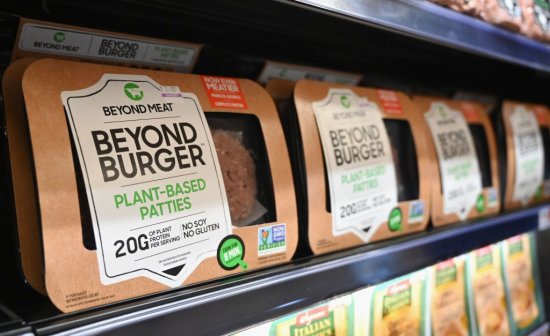
Beyond Meat, once the highflying harbinger of a plant-based meat revolution, took another beating on Wall Street this week.
Beyond Meat, once the highflying harbinger of a plant-based meat revolution, took another beating on Wall Street this week, the latest setback for the one-time investor darling amid months of tough financial news.
Despite recent efforts to cut prices, the company’s revenue fell more than 30% in the second quarter this year, according to its most recent financial report, released Aug. 7. The company also scaled back its revenue outlook and warned that may face delays in reaching its goal of becoming cash flow positive in the second half of the year. That bad news had an immediate effect on the company’s stock price, with Beyond Meat stock sliding almost 20% since Monday afternoon.
[time-brightcove not-tgx=”true”]Those sales numbers would seem to indicate that in a challenging economy for spenders, products meant to address concerns about animal welfare and planet-warming emissions just can’t compete if they’re straining consumers’ pocketbooks. But that’s not as bad for companies like Beyond as another plausible interpretation: that the whole movement toward plant-based meat was nothing but a fad to begin with.
Read more: A High Steaks Game: Can Beyond Save the Alt-Meat Industry?
In a conference call yesterday, Beyond Meat CEO Ethan Brown cited economic factors like inflation and high interest rates that have reduced customer appetites for expensive meat alternatives. He also pointed to what he says is a persistent narrative problem. Groups opposing plant-based meat have run attack ads in recent years hammering the company for the extensive processing that goes into its products, and the talking points have stuck around, continuing to circulate on the internet. “There is a considerable gap between the strong health credentials of our products and a broader…narrative that is now afoot,” Brown said during the Aug. 7 conference call. “This gap appears to have widened.”
Brown elaborated on those themes in an exclusive interview with TIME last month. In a hotel room in Manhattan, Brown held up a laptop showing a slide with about a dozen study titles and headlines on the health risks of consuming meat. But it’s Beyond Meat that has been on the defensive when it comes to the health of its products. “The incumbent [meat] industry felt this was a big threat…so they began a campaign about four years ago, saying this is ‘fake meat, real chemicals’ like, really negative stuff,” Brown said.
The company is trying to turn the narrative around. In a promotional video posted to YouTube on Aug. 4, the company showed farmers and lush fields, touting the “simple and clean process of heating, cooling, and pressure” that turns plant protein into burger and steak substitutes.
Read more: What to Eat if You Want to Save the Planet and Your Health
In the long run, Brown believes that the increasing salience of climate concerns will push customers towards Beyond products, since plant-based meat substitutes have a much lower emissions profile than meat from animals (between 30% and 90% lower, according to the Good Food Institute, a think tank focused on promoting meat alternatives). “One cannot help but notice the urgent intensification of climate dialogue across global leadership and societies,” Brown said in the Aug. 7 conference call. “The abstract notion of climate change is increasingly tangible to the everyday consumer.”
The question is whether Brown and Beyond Meat will be able to get consumers to start thinking more along that sort of narrative, and how long it might take.
“You just keep knocking on the door until you get through,” Brown said last month. “I think this is the time to get through.”